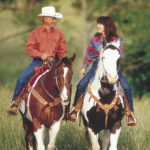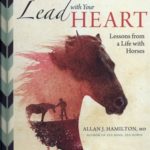Wherever you’re headed to ride, here are some items to consider not leaving home without:

Riding boots — If you don’t own boots made specifically for riding, boots with a hard sole and about a 1 to 1.5 inch heel will work. You don’t want anything to chunky. The heel is so that your foot doesn’t slide through the stirrups and get caught. It’s a safety thing. Beware of riding in tennis shoes, as these can slip through the stirrup. If you’re excited to dress up in the latest equestrian fashions, get cowboy boots for Western style riding at American ranches or paddock boots (ankle length boots that riders wear with half chaps) for English style excursions in Ireland or beyond. Make sure to break them in and that they fit comfortably before you take off on your riding adventure.
If you area headed somewhere tropical or hot or somewhere that you’ll try multiple sports, like hiking or whitewater rafting along with riding, you’ll want to consider all terrain-riding boots that you can wear in and out of the saddle. In somewhere like the rainforest, you may be riding through rivers and water. I did this in Costa Rica and was glad that I had on my all terrain boots, which dried more quickly. Consider getting the waterproof kind.
Pants — If you’re riding in jeans, look for a pair that has some stretch. Riding is an active endeavor, and you’ll need your jeans to give a bit as you climb in and out of the saddle. Also, try to find jeans with a flat inseam (the seam that runs down the inside of the leg), so that you don’t get a rub. If you are headed to Ireland or another destination where they ride English style, you may want to try riding tights or traditional breeches.
Riding gloves ? For long days in the saddle, wear gloves or bring some with you in your daypack, pocket or saddlebag. Gloves help you grip the reins and also help save your hands if you have a horse that tries to eat grass along the trail while you are holding onto the reins.
Helmet ? If you don’t own an ASTM/SEI certified helmet, ask the stables where you are riding to see if you can borrow one for your vacation. They should have helmets on site. If you are riding a long distance or in warmer temperatures, get a lightweight, vented helmet.
Rain gear ? When braving the great outdoors, you never know what the weather will do. Consider strapping a rain jacket to your saddle, preferably a raincoat made of fabric that is not too noisy, as you don’t want your raincoat to spook your horse. Waxed jackets work well, especially in cooler climates. In some destinations, like mountain rides in Alberta or treks in Iceland, you might want to consider waterproof pants or a long raincoat. When the sun takes a break and the clouds gush open, you’ll be glad to be dry, especially if you are out for more than just the day.
Warm or cool layers — For cooler weather rides, layers of fleece or wool will keep you cozy. Even on a warm day, it’s a good idea to bring a lightweight long-sleeved shirt to protect your arms from the sun or in case the weather takes a turn. I like to wear sweaters and fleece jackets that zip or button, so that I can shed them quickly during the day and then also put them back on easily.
Sunscreen and lip balm ? If you are going to be active outside, packing and/or lathering on some sunscreen and lip balm with SPF. Get sweat proof sunscreen if you can. Nothing?s worse at the end of a day?s ride than finding out that you look like a tomato. Plus, the lip balm will keep your lips from getting too dry.
Bandana — A bandana or scarf can have a multitude of uses. I like to tie one around my neck for protection from the sun, but cowboys of old also used bandanas on cattle drives, as pot holders when cooking, to cover their mouths so that their lungs didn’t fill with dust on the trails, or even to tie over a wound or to repair something.
Swimsuit — I usually bring one just in case. They?re small, so easy to stuff somewhere in your suitcase. You may end up wanting to take a dip in a place you didn’t even imagine would be good for swimming like Iceland. Those hot pots do wonders after a day on the trail.
Passport, important documents and copies — If you’re traveling abroad, you’ll want to bring your passport, along with photocopies, just in case your passport is lost or stolen. Photocopies (packed and carried separately from the original) can help you get a replacement more easily. A few extra passport sized photos of yourself don’t hurt either. Of course, you’ll want to bring any tickets for flights and confirmations for rental cars, etc., along with your license or ID.
Snacks — If you get hungry frequently like me, consider stashing some granola or power bars in your suitcase. You may not use them, but if you get hungry, you’ll be glad that you have them.
Earplugs or headphones — I usually travel with headphones in case the flight is noisy and I want to get some sleep or I’m camping or sleeping somewhere in which the noises perturb me. You’re on the road, so there are bound to be different sounds than you’re used to at home. (Also, I like to listen to music on my travels.) Putting some small foam earplugs or headphones in your bag are a good idea.
Tissues — I have a few in my pockets when riding and in my travel bag just in case. There isn?t always TP on the trails.
First aid kit — With any medicines, contact lenses or solutions or prescriptions you need or might need. It might not be easy to hit the drug store or pharmacy on your riding adventure, as many trips are remote.
Extra bags — I usually stuff a few extra plastic bags in my suitcase for separating dirty laundry, muddy shoes and more from my other clothes. Also, if you are packing shampoo, liquid soap or anything like that, you might want to zip it in a zip lock in case it decides to explode on your flight or it’s something you want to bring on the flight. If you’re planning on bringing back more from your trip than you left with, consider packing an extra bag in your suitcase.
Insect repellant — Depending on where you are going, you’ll want to consider bringing this along.
Flip flops — Come in handy if you are showering in the great outdoors or somewhere that you?d just feel more comfortable wearing shoes.
Journal — Your vacation will probably fly by too quickly. If you are like me and want to remember the details, pack a journal. It can be relaxing to sit in the afternoon or early evening with some snacks and maybe a glass of wine or hot tea and write.
Toiletries — I like to pack smaller versions of my shampoo, conditioner and usually bring a small bar of soap, just in case I need it. Also consider hand sanitizer and face wipes. These two items can make you feel refreshed on long flights or travels to far away places.
Travel alarm clock — I have a small fold up alarm clock that is great for travel.
Flashlight — Usually a small one will work. Remember, if you’re on a riding vacation, you might be either camping or staying in a remote area, like a ranch, where the only lights at night are the stars. This is nice, but you’ll want a flashlight for getting back to your tent or cabin at night. I?ve tried the light on my phone when navigating to a tent, and trust me a flashlight is better.
Camera — We’re filming a lot, so I?ve usually got this covered, but I always like my own candids.
Adaptors and convertors — If you’re traveling abroad, check out what type of electrical plugs or convertors you’ll need to charge personal items.
Sports bra — Remember, riding is a sport, so this is an item women riders don’t want to forget.
Some other items to consider including are water for you and your horse, carrots or apples for your horse and possibly a seat saver or riding underwear? yes, they make seat cushions and padded underwear for those of us who aren?t used to staying in the saddle, but that’s getting a little too personal.
Once you’re ready to go out and ride, there are other safety items that you want to make sure your riding guide or you have with you: a mobile phone, hoof pick, tools in case you have to take off a horse’s shoe or take out big rock, matches, a compass and first aid kit.
Check with your tour company or the establishment where you are headed for suggestions. The tour operators know their area best and can advise you on the necessities that will make your time there the most comfortable. They may also have items that you can borrow once you’re there. This can save you having to bring something large or heavy in your suitcase.
Remember to pack lightly and smartly. Keep it simple and practical and you’ll find happier and longer trails ahead.
Learn more about equestrian vacations at EquitrekkingTravel.com and Equitrekking.com
Darley Newman is the host and producer of the Emmy Award-winning PBS TV show Equitrekking??, which takes viewers on horseback riding vacations around the world. Purchase Equitrekking DVDs, the Equitrekking Travel Adventures on Horseback book and horse gift itmes at ShopDarley.com








